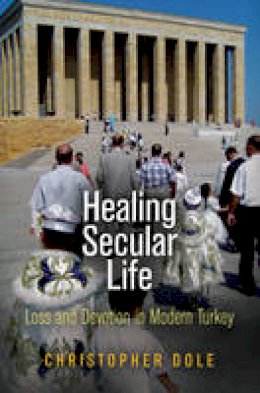
Stock image for illustration purposes only - book cover, edition or condition may vary.
Healing Secular Life: Loss and Devotion in Modern Turkey (Contemporary Ethnography)
Christopher Dole
€ 121.20
FREE Delivery in Ireland
Description for Healing Secular Life: Loss and Devotion in Modern Turkey (Contemporary Ethnography)
Hardcover. Anthropologist Christopher Dole investigates the controversial position of religious healing in modern Turkey, demonstrating that the authority of the religious healer is deeply embedded within Turkey's history of secular reform, and that religious healing and secularism share a set of common stakes. Series: Contemporary Ethnography. Num Pages: 304 pages, 18 illus. BIC Classification: HRQA; JHM; VXA. Category: (U) Tertiary Education (US: College). Dimension: 229 x 152 x 28. Weight in Grams: 612.
In contemporary Turkey-a democratic, secular, and predominantly Muslim nation-the religious healer is a controversial figure. Attracting widespread condemnation, religious healers are derided as exploiters of the sick and vulnerable, discredited forms of Islamic and medical authority, and superstitious relics of a pre-modern era. Yet all sorts of people, and not just the desperately ill, continue to seek them out. After years of research with healers and their patients in working-class neighborhoods of urban Turkey, anthropologist Christopher Dole concludes that the religious healer should be regarded not as an exception to Turkey's secular modern development but as one of its defining figures. Healing Secular Life demonstrates that religious healing and secularism in fact have a set of common stakes in the ordering of lives and the remaking of worlds. Linking the history of medical reforms and scientific literacy campaigns to contemporary efforts of Qur'anic healers to treat people afflicted by spirits and living saints through whom deceased political leaders speak, Healing Secular Life approaches stories of healing and being healed as settings for examining the everyday social intimacies of secular political rule. This ethnography of loss, care, and politics reveals not only that the authority of the religious healer is deeply embedded within the history of secular modern reform in Turkey but also that personal narratives of suffering and affliction are inseparable from the story of a nation seeking to recover from the violence of its own secular past.
Product Details
Publisher
University of Pennsylvania Press
Format
Hardback
Publication date
2012
Series
Contemporary Ethnography
Condition
New
Weight
612g
Number of Pages
304
Place of Publication
Pennsylvania, United States
ISBN
9780812244168
SKU
V9780812244168
Shipping Time
Usually ships in 7 to 11 working days
Ref
99-1
About Christopher Dole
Christopher Dole is Associate Professor of Anthropology at Amherst College.
Reviews for Healing Secular Life: Loss and Devotion in Modern Turkey (Contemporary Ethnography)
A well written and structured mature ethnographic work that investigates into the micro-politics of secularism in refreshing ways. It constitutes an important contribution to the study of neglected practices and worldviews at the margins of Turkish society, which were forced into exilic locations by secularist as well as normative Islamic discourses. -Anthropos A fine ethnography that examines the cultural politics of healing practices in contemporary Turkey. It offers a fresh and original account of the cultural discourses and modes of aesthetic representation and perception that congeal around questions of religious healing. -Robert Desjarlais, Sarah Lawrence College A very impressive, theoretically sound and consistent, and empirically detailed account of how state power and its secularist project in Turkey excludes, despises, attacks, and yet contains and controls the religious therapeutic authority. -Berna Turam, Northeastern University Healing Secular Life is a remarkable examination of the intersecting worlds of secularism and religion in Turkey, as seen through the experience of popular religious healing. Dole's great accomplishment is to project the aesthetic and moral sides of therapeutic remaking of people's lives and worlds as the ethnographic framing for understanding how politics and religion come together in the sensibility of ordinary people who are living through an extraordinary time. A fascinating and compelling ethnography. -Arthur Kleinman, Harvard University
